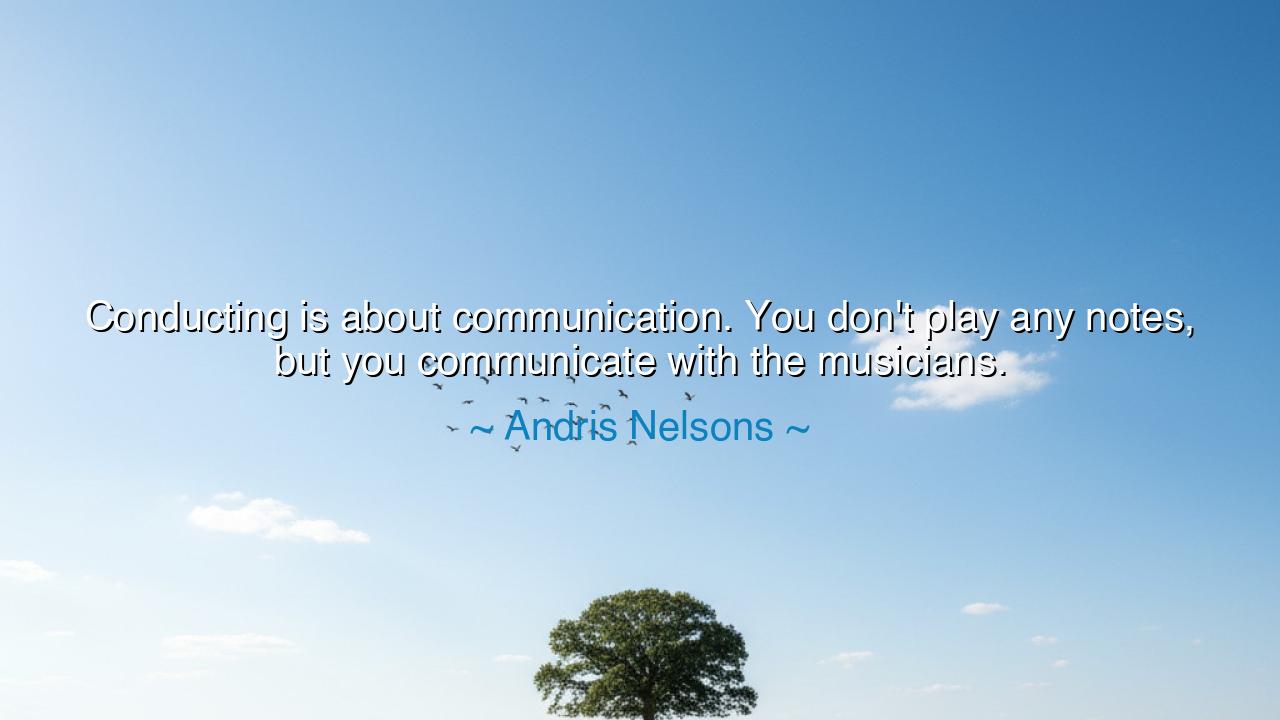
Conducting is about communication. You don't play any notes, but
Conducting is about communication. You don't play any notes, but you communicate with the musicians.






Host: The air in the room was thick with anticipation, the kind that comes just before a storm—charged, tense, as if something grand was about to unfold. The stage lights shone down on the orchestra, their instruments gleaming under the warm glow, ready. In the center, Jack stood, his eyes trained on the musicians, his hands poised in the air. Jeeny sat at the edge of the audience, her hands clasped tightly, waiting. The silence was almost palpable, the hum of the world outside seeming a distant echo.
Jack: “I still don’t get it, Jeeny. How does it work? He doesn’t even play an instrument. He’s just standing there, waving his hands, and somehow, it all comes together. What’s the point of conducting if you’re not actually playing anything?”
Jeeny: “It’s about communication, Jack. Conducting is about connecting with the musicians without needing words, without needing to play a single note. It’s the conductor’s job to feel the music, to channel the energy of the entire orchestra, to guide them with just a glance, a gesture.”
Jack: “But how? How can you lead without doing anything? If you don’t have the skills of the violin or the power of the piano, what’s left? It’s like being a manager who’s never done the work themselves. It feels… hollow.”
Jeeny: “It’s not hollow, Jack. It’s about a different kind of skill. A conductor doesn’t need to play, but they need to understand. They need to feel the pulse of the music in their bones, the emotion behind every note. It’s all about the connection—with the musicians, with the piece itself.”
Jack: “So you’re telling me that a guy who doesn’t even touch the instruments can make all the difference? That just doesn’t make sense. He’s not playing, he’s just directing. Isn’t that a bit… overrated?”
Jeeny: “It’s more than just direction, Jack. It’s a conversation between the conductor and the orchestra. The conductor’s movements are like words; the music is the language. He speaks without saying a word, guiding, shaping, inspiring the musicians to reach for something higher. You can’t just rely on logic to understand it. It’s intuitive. Musicians feel that connection—they feel seen, heard, even when they don’t have to speak a word themselves.”
Jack: “I get that, but in the end, aren’t the musicians the ones doing all the work? They’re the ones playing the notes, making the music. The conductor is just there for show, isn’t he?”
Jeeny: “No, Jack. Think of it like this. You’ve seen an orchestra play, right? Without the conductor, it’s just a bunch of individuals, each playing their part, but disconnected. The conductor is the one who brings them together, who creates the unity. They make sure every musician is playing in harmony with the others, in sync with the heart of the piece.”
Jack: “So, the conductor is like the glue, the one who makes sure it all sticks together?”
Jeeny: “Exactly. Without that guidance, the music falls apart. Think of it like a conversation—without a guide, people talk over each other, they interrupt, they get lost. But with a good conductor, everyone is heard, everyone knows when to speak and when to listen. It’s the same with music. The conductor holds the space where everything can come together in the right way.”
Jack: “But isn’t that still the musicians’ work? I mean, they’re the ones playing the instruments, right? The conductor is just there to make sure the timing is right.”
Jeeny: “Timing is important, yes, but it’s more than that. It’s about presence. The conductor’s energy fills the room. It’s almost like they can sense the momentum of the music and adjust, leading with subtle cues. It’s a dance, a delicate balance between control and freedom.”
Host: The lights flickered slightly as the orchestra began to warm up, their instruments tuning in unison. Jack’s gaze shifted from the conductor to the musicians, their movements precise, yet fluid. Jeeny watched him, knowing she had planted a seed, waiting for him to see it bloom.
Jack: “I see what you’re saying now. It’s like the conductor is a bridge, connecting everyone’s individual talents. They’re not controlling the music, they’re shaping it.”
Jeeny: “Exactly. It’s like the conductor’s job is to feel the flow of the piece, to guide the orchestra through it, rather than just direct. They become the vessel for the music, transmitting what’s on the page into something alive.”
Jack: “It’s funny, isn’t it? How something so invisible, like communication, can hold everything together. And here I was, thinking a conductor was just a guy with a stick.”
Jeeny: “And now you see that the stick is just the tool. The real power is in the connection, the intention, and the energy they bring. The conductor isn’t just telling them what to do, they’re speaking to the heart of the music. Without them, the orchestra would be lost, scattered, unsure.”
Host: Jack leaned back, a small smile curling at the corners of his lips. Jeeny gave a soft, knowing look. The orchestra, once only a distant murmur, now filled the room with its vibrant energy, guided by the invisible force of the conductor’s hands.
The music had begun, and everything—the communication, the connection, the unity—was finally clear.






AAdministratorAdministrator
Welcome, honored guests. Please leave a comment, we will respond soon